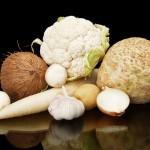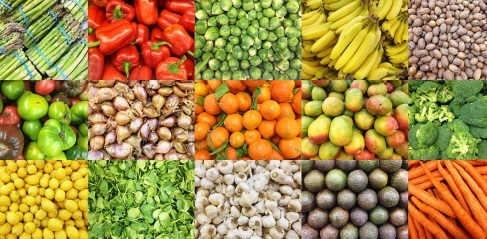The Healthy Truth: How to Swap Your Carbs with Veggies
 Dear Friend,
Dear Friend,
Everywhere you look you get the same story – carbohydrates are the enemy. Numerous food brands are lowering their carbs because we’re told that carbs are the reason why we can’t lose weight so we should eliminate them as much as possible. Now I, too, can admit I’ve tried no-carb diets, and they are by far the hardest to follow. You get dizzy, your energy plummets, and you basically feel like you have the flu.
If carbs are the enemy, then why do we feel so bad when we don’t eat them? That’s because our bodies need carbs, but the good ones – like whole grains – not processed white bread and pastas. The problem is, we are so used to eating junk that we think it’s all or nothing – remove carbohydrates or stay heavy forever! My friend, this isn’t the case, and I promise you can very well eat your carbohydrates and enjoy them without an extra pound added.
It’s all about choice. Choosing the right carbs over the wrong ones and knowing at what time of day you can eat them can lead you to success in your weight-loss journey.
But aside from the fact that we eat the wrong types of carbs, we also eat too many of them. So instead of eliminating carbohydrates completely, I am offering you a solution: Start picking the good carbohydrates and swap the bad ones out with vegetables.
You may have heard about how vegetables are replacing pasta and rice. Zucchini noodles, spaghetti squash, and cauliflower rice are all the hype right now. Not only is this a great way to lower your carbohydrate intake, but it also helps you stock up on vegetables, which many of us are simply not eating enough of.
 My first experience with replacing rice with veggies was a few years back. I was scrolling through Pinterest and found a recipe suggesting that if you grate cauliflower you can get rice. I thought it looked easy enough, so why not try it. So I grated up a whole cauliflower – this can be a messy task, so break the pieces down into smaller, more controllable ones – and decided to make a quick rice stir fry with vegetables, egg, and some soy sauce.
My first experience with replacing rice with veggies was a few years back. I was scrolling through Pinterest and found a recipe suggesting that if you grate cauliflower you can get rice. I thought it looked easy enough, so why not try it. So I grated up a whole cauliflower – this can be a messy task, so break the pieces down into smaller, more controllable ones – and decided to make a quick rice stir fry with vegetables, egg, and some soy sauce.
Let me tell you it was not only the simplest meal I’ve made, but incredibly delicious, too! I was obsessed and basically ate it for a week straight.
More recently, I was introduced to spaghetti squash. A woman from my work always had these amazing looking lunches, and when I asked once what she was eating she said it was spaghetti squash. Considering I can no longer eat wheat spaghetti, squash sounded like a delicious alternative so I had to try it right away.
I went out to get a spaghetti squash, cut it in half, placed it on a backing sheet and allowed it to soften up in the oven. When I took it out, to my surprise simply running a fork through it literally gave me spaghetti-like noodles! Once again, SUPER easy, minimal effort required.
I would add tomato sauce or pesto sauce, practically anything works with it, really, and I didn’t miss regular spaghetti one bit.
My friend even told me about her own recipe, where she used spaghetti squash to make a burrito bowl and added ground beef and other traditional burrito toppings to make a healthier alternative from using pita wraps – the possibilities are truly endless.
If you’re not convinced that swapping your regular pasta and rice for vegetables is a good idea, let’s take a look at the numbers then:
Nutritional Value of Cauliflower (1 small head)
Calories 66 Fat 0.7 grams Carbohydrates 13 grams Sugar 5 grams Fiber 5 grams Protein 5 gramsNutritional Value of White Rice (100 grams)
Calories 130 grams Fat 0.3 grams Carbohydrates 28 grams Sugar 0.1 grams Fiber 0.4 grams Protein 2.7 gramsNutritional Value of Spaghetti Squash (100 grams)
Calories 31 Fat 0.6 grams Carbohydrates 7 grams Sugar 2.8 grams Fiber 1.5 grams Protein 0.6 gramsNutritional Value of Spaghetti (100 grams)
Calories 131 Fat 1.1 grams Carbohydrates 25 grams Sugar 0.8 grams Fiber 2.5 grams Protein 8.1 gramsAs you can see, going veggie definitely has some pros and can offer you many more nutrients your body needs than rice and pasta can. Furthermore, you can enrich your meal even more, depending on what you add. You can add spinach, goat cheese, tomatoes, or keep it simple with an olive oil dressing – the possibilities are endless!
If you haven’t tried swapping out your traditional pasta and rice with vegetables yet, I would highly recommend it. Not only is it easy, but it’s delicious, too. Everyone around the table will enjoy it, and it’s especially good for those individuals who have health concerns like diabetes, for example. Basically, cooking with vegetables is a win for everyone, and you’ll be surprised how often you will start making the easy swap when it comes to your nightly meals.
Now that I’ve shared with you my experiences of cooking with vegetables, have you already tried zucchini, spaghetti squash, or cauliflower as a main dish? I would love to hear about the creative ways in which you swap out traditional carbohydrates with vegetables. Leave a comment below!
Until next week,
Emily
Read more on The Healthy Truth
Share this information
-
How to Target and Reduce Body Fat
Exercise and a healthy diet can help you reduce body fat, but it can b
-
How Women Can Boost Their Metabolism and Lose Weight
With regards to weight reduction, men no
-
SelfSabotage Snacking After Gastric Bypass Surgery Why Do We Do It
LivingAfterWLS reader feedback indicates snacking is the single bigges
-
4 Steps To A New Lifestyle For A Slimmer Healthier Happier YOU
So you want to lose weight to look better and feel better. You are not
-
The Ugly Truth About Exercise Equipment
You have probably all seen the various fitness equipment commercia
-
What Is Yohimbe And How Does It Help One Lose Weight?
Yohimbe or yohimbine as most scientists would call it, is best known a
- DON'T MISS
- 7 Reasons you should eat more raisins
- Rapid Weight Loss Vs. Slow, Sustained Weight Reduction
- Prunes Not Just For Old Folks
- Easy Weight Loss Tips
- 5 Foods To Eat Yourself Slim
- Low Carb Diet Plan The Science Behind The Low Carb Diet
- Choosing A Hypnotherapist For Weight Loss
- We Are Water! We Are Water!
- Stop Making Excuses - Make Up Your Mind to Lose Weight Now
- Find the Truth About the Eat Stop Eat Diet Scam




